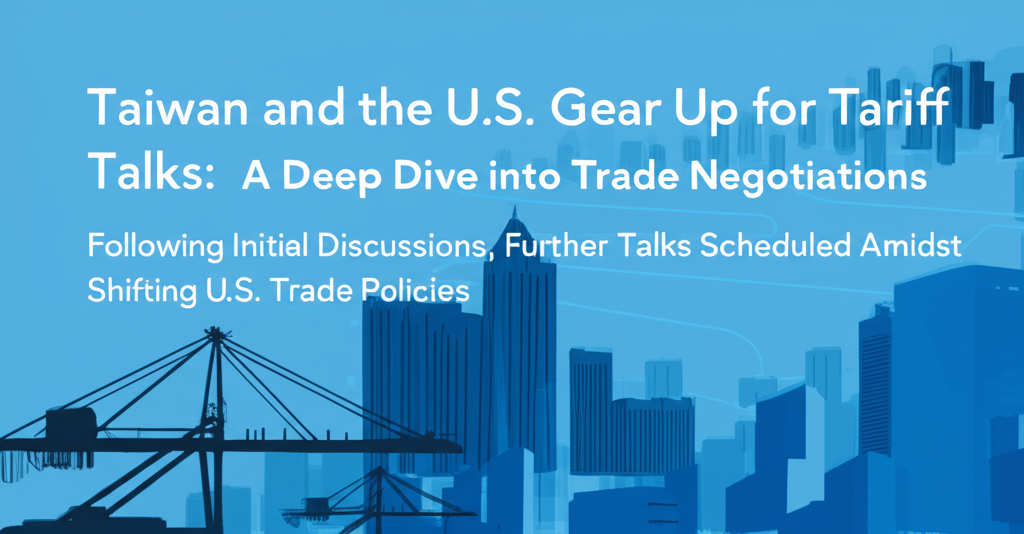Taiwan and the U.S. Gear Up for Tariff Talks: A Deep Dive into Trade Negotiations
Following Initial Discussions, Further Talks Scheduled Amidst Shifting U.S. Trade Policies

Taipei, April 12 – Taiwan and the United States are set to continue discussions regarding tariffs following their first meeting, which took place on Friday U.S. time. This was confirmed by the Office of Trade Negotiations under Taiwan's Executive Yuan.
The office confirmed on Saturday Taipei time that the negotiation teams from Taiwan and the U.S. held a teleconference, during which they exchanged perspectives on reciprocal tariffs introduced by U.S. President Donald Trump, as well as other critical issues like non-tariff trade barriers and export controls.
Citing a mutual understanding, the office chose not to disclose further details from the discussions, but did announce that further talks are scheduled in the near future.
President Lai Ching-te (賴清德) stated that Taiwan was among the first nations to engage in tariff negotiations with the U.S. concerning the Trump administration's latest tariff announcements, which had caused repercussions in global financial markets.
On April 2 U.S. time, Trump unveiled broad "reciprocal tariffs" on U.S. trading partners. This included a 32 percent tax on Taiwanese goods, initially slated to take effect on Wednesday.
Furthermore, Trump declared a 10 percent baseline tax on imports from all countries, commencing April 5. Nations with significant trade surpluses with the United States were facing higher duties starting Wednesday, including Taiwan (32 percent), China (34 percent), Japan (24 percent), South Korea (26 percent), Vietnam (46 percent), and Thailand (37 percent).
However, on Wednesday afternoon U.S. time, Trump announced a 90-day pause on the new measures. Reduced 10 percent duties were to be applied instead to all countries except China.
Lai has affirmed that Taiwan has no intention of implementing retaliatory measures in response to the U.S. tariffs. He aims to enter negotiations with the Trump administration with the objective of "zero tariffs," using the United States-Mexico-Canada Agreement (USMCA) as a model.
Lai acknowledged the "significant impact" of the 32 percent tariff on Taiwan's economy but encouraged the public to remain calm, citing the country's robust economic fundamentals.
Regarding non-tariff barriers, Taiwan is included on the latest U.S. list of trading partners with trade barriers. This was according to a report released by the Office of the United States Trade Representative (USTR) on March 31, two days before Trump's reciprocal tariff announcement.
The report raised concerns regarding Taiwan's tariffs on goods imported from the U.S., in addition to non-tariff barriers, technical trade barriers, measures related to animal and plant quarantine, intellectual property rights protection, the service sector, and investments, among other barriers.
According to Lai, although 23.4 percent of Taiwan's exports went to the U.S. in 2024, over 75 percent were shipped to other markets.
He emphasized that among the goods exported to the U.S., competitive information and communication technology (ICT) products and electronic components accounted for 65.4 percent. This highlights Taiwan's economic resilience, driven by the strength of advanced tech items.
Other Versions
Error: All DeepL API keys exceeded 95% usage.
Error: All DeepL API keys exceeded 95% usage.
Error: All DeepL API keys exceeded 95% usage.
Error: All DeepL API keys exceeded 95% usage.
Error: All DeepL API keys exceeded 95% usage.
Error: All DeepL API keys exceeded 95% usage.
Ang Taiwan at U.S. Naghahanda para sa Mga Usapang Taripa: Isang Malalim na Pag-aaral sa mga Negosasyon sa Kalakalan
Error: All DeepL API keys exceeded 95% usage.
ไต้หวันและสหรัฐฯ เตรียมพร้อมสำหรับการเจรจาภาษี: เจาะลึกการเจรจาการค้า
Đài Loan và Hoa Kỳ Chuẩn Bị Cho Các Cuộc Đàm Phán Thuế quan: Đi Sâu vào Các Cuộc Đàm Phán Thương Mại

